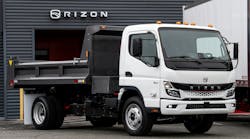Idle Free Systems has selected the Trojan OverDrive AGM 31 battery to power its Idle Free Electric APU, according to an announcement from Trojan Battery Company. The OverDrive AGM 31 battery is a sealed, deep-cycle, absorbed glass mat (AGM) battery specifically engineered for powering idle elimination systems for long periods of time.
Built on proprietary deep-cycle technology, the OverDrive AGM 31 battery is optimized for high power density, Trojan noted. Its heavy-duty cycling and deep-discharge characteristics are designed to allow the OverDrive to provide a steady current in excess of 10 hours. The battery comes with a 30-month warranty and is supported nationally through Trojan’s master distributor network.
"The Idle Free Electric APU is the only idle-elimination system currently available that can meet all the needs of drivers” said Robert Hopton, president & CEO of Idle Free. “It is a complete electric APU solution offering drivers and fleet operators a cost-effective alternative to discretionary idling. This translates into a maximum return on investment for drivers and fleet operators—a return that is only going to improve with the help of the Trojan OverDrive AGM battery."
“We are excited to welcome Idle Free Systems to Trojan’s global alliance of OEM partners. Trojan’s OverDrive AGM 31 is engineered specifically to meet the heavy-duty cycling requirements of battery-based, idle-elimination systems like the Idle Free Electric APU, providing commercial truck drivers a comfortable cab and sleeper environment,” said Elke Hirschman, vp of marketing for Trojan Battery.
Today, 18 states have state-wide idling regulations, as does the District of Columbia. Most of the regulations limit idling to under five minutes and some restrict it to less than three minutes.
Enforcement of idle reduction regulations is also on the rise and penalties can be tough, especially within cities and other population-dense areas, many of which have their own, even stricter idling limits. Nevada’s Clark County, which includes Las Vegas, set fines at “not to exceed $10, 000,” while the State of Connecticut caps fines at $5,000 per week. Run a diesel-powered refrigeration unit for more than five minutes within 100 feet of a residential or school area in the City of Sacramento, CA and you may be fined $100 to $25,000 per violation. Imprisonment is also a possibility for offenders in some locations, such as Denver, CO or New York City, NY—risks that can put the ROI for idle-reduction devices into a whole new light.
The American Transportation Research Institute (ATRI) is now tracking idling regulation nationwide and providing the information to fleets in two free, PDF formats: as a list and in a foldable cab-card format. The lists are available from their Website at: www.atri-online.org.


